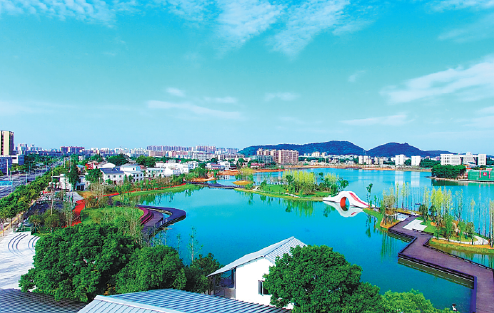Urban renewal transforms historical city

The revamped Houhu Lake in Changsha has a picturesque landscape. CHINA DAILY
Changsha, a renowned historical and cultural city in Central China's Hunan province, is setting a new standard in urban renewal to raise the city's image and improve people's living standards, according to a senior official.
"By means of urban renewal, the quality of the urban residential environment has been raised and continuously improved," said Zhou Fei, director of the Changsha Urban Human Settlements Bureau.
The city, which has a long history that dates back to 100,000 to 150,000 years, has followed a philosophy of people-oriented development, he noted.
In 2019, the government set up the bureau ahead of the majority of Chinese cities. It concentrates its efforts on the protection of valuable ancient and modern architecture, and carrying out the urban renewal in a more scientific, efficient and precise way, said Zhou.
According to Zhou, the bureau creatively worked out a six-step method for urban renewal, which comprises a thorough urban physical examination, improving the organizational mechanisms, preparing the renewal plans, implementing the renewal in groups, carrying out dynamic monitoring and publicizing the livable index.
As a fundamental factor of the urban renewal, the urban physical examination includes 61 items, of which many are the most pressing issues that people living in the old residential compounds have to face, such as the schooling problems, shortage of hospital beds, parking availability and elevators.
For a residential area that is identified as a historical project, most of the buildings in the compound will be kept and carefully renovated following its original blueprint, said Zhou.
As a result, it will look like an ancient compound, keeping many historical relics and bringing to life the city of the past, but with greatly improved functions and facilities.
For the ordinary old residential areas, the government will pull down the illegal buildings, re-arrange the water supply and drainage networks, increase and improve the equipment such as the nursing homes, healthcare centers, public fitness centers, 5G base stations and new energy charging piles and enhance public spaces such as the greenery and parks, Zhou noted.
In the key areas with a large population, the local government will also improve the infrastructure and public facilities for the residents such as building new schools, hospitals, roads and public parking lots.
Changsha renovated 225 old residential areas from 2019 to 2020, which will rise to 368 this year and 576 next year.
The move will benefit about 300,000 households as a whole, according to the official figures.
During the period of 2016 to 2020, a total of 14 historical communities in Changsha got revamped, in which more than 80 relics and pieces of historical architecture have been well preserved.
At the same time, the city built pedestrianized streets with an accumulate length of 69.5 kilometers in different communities to reproduce the unique scenes of the ancient city.
As a result, Changsha has been selected as one of the 10 happiest cities in China for 13 years consecutively and its population, with 3 million people moving to the city in the last 10 years, surpassed 10 million in 2021, the official data showed.

The renovated Baiguoyuan community in Changsha has a traditional architectural style. CHINA DAILY








